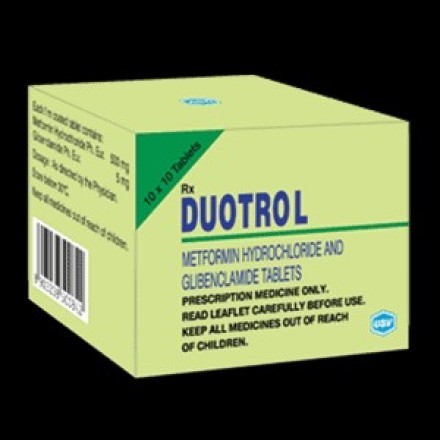All Details About Duotrol Tablet
Find out detailed description, uses, directions of use, side effects, warnings and precautions, frequently asked questions about Duotrol Tablet
Description:
DUOTROL is a combination of Glibenclamide and Metformin which belongs to the group of medicines called Antidiabetic agents. It is used in adults to treat type II diabetes mellitus along with diet and exercise.
Type II diabetes mellitus is a chronic disease characterized by abnormally high levels of glucose in the blood. It is caused due to inadequate production of a hormone called insulin (produced by pancreas to metabolize glucose) in the body or if the body cannot utilize the secreted insulin properly.
Uses:
In Treatment of Type 2 diabetes mellitus
Duotrol Tablet is a medicine that helps to control high blood glucose (sugar) levels. It helps get rid of extra glucose from your body through urine. It also improves the body’s response to the hormone insulin, which is responsible for regulating blood glucose (sugar) levels in our body. The insulin helps to lower your blood glucose levels and prevents them from rising after taking meals. You should keep taking it for as long as it is prescribed.
Lowering blood glucose levels is an essential part of managing diabetes. If you can control the level you will reduce the risk of getting any of the serious complications of diabetes such as kidney damage, eye damage, nerve problems, and loss of limbs. Taking this medicine regularly along with proper diet and exercise will help you live a normal, healthy life.
Directions For Use:
Take this medicine in the dose and duration as advised by your doctor. Swallow it as a whole. Do not chew, crush or break it. Duotrol Tablet is to be taken with food.
Side Effects:
- Nausea
- Vomiting
- Diarrhea
- Flatulence
Warning & Precautions:
You should not take it if you have type 1 diabetes mellitus, if you have diabetic ketoacidosis (high levels of acid in your blood), or if you have severe kidney or liver disease. Before taking this medicine, tell your doctor if you have ever had heart disease. It may not be suitable. Pregnant or breastfeeding women should also consult their doctor before taking it. Your blood sugar levels should be checked regularly and your doctor may also advise blood tests to monitor your blood cell counts and liver function.
FAQs:
Q: Does DUOTROL cause weight gain?
Yes. DUOTROL may cause weight gain in some individuals. To avoid this, follow a healthy diet and regular physical activity as advised by your physician. However, if it bothers you, consult your doctor.
Q: How to take DUOTROL?
You must take DUOTROL as advised by your physician. Try to take DUOTROL preferably after meals. Swallow the medicine with a glass of water. Do not crush or chew the medicine.
Q: Can DUOTROL be taken with insulin?
Consult your doctor before taking DUOTROL along with insulin, as it may increase the chances of hypoglycemia (decreased blood sugar levels).
Q: How much DUOTROL should I take?
DUOTROL should be used only under medical supervision. Your doctor will decide the correct dose and duration of therapy for you depending upon your age, body condition and severity of the disease condition.
Q: What should I do if I experience low blood sugar after taking DUOTROL?
Low blood sugar is a common side effect of taking DUOTROL. Try to have sugar rich food items such as fruit juice, glucose tablets or gel, soft drinks, honey, or sugary candy. If you cannot any improvement in your condition or if your condition worsen, contact your doctor.
Q: Can DUOTROL cause dizziness?
Yes. Dizziness is a common side effect of using DUOTROL. In case you experience dizziness, lie down until it passes, then get up slowly and carefully. Get adequate rest. Drink plenty of water and other fluids. Avoid smoking and consumption of alcohol. Do not drive or use machinery to avoid accidents. Consult your doctor if you experience dizziness continuously for a long time after taking DUOTROL.
Q: What are the side effects of DUOTROL?
One of the most common side effects of taking DUOTROL is hypoglycemia (low blood sugar levels). To treat this, you can snack on foods rich in sugars such as biscuits, candies etc. Other common side effects of taking DUOTROL are headache, dizziness, nausea, weight gain and changes in taste. Contact your doctor if any of these side effect worsens.
Q: What precautions do I need to follow while taking DUOTROL?
Before taking DUOTROL, inform your doctor if you have any liver, kidney or heart problems. You must also inform your doctor if you have hormonal problems or if you are malnourished. DUOTROL is not suitable for use in patients with type I diabetes mellitus. Consult your doctor before taking DUOTROL if you are pregnant or planning to become pregnant. During therapy with DUOTROL, follow the diet and lifestyle changes instructed by your doctor. Always carry a sugary snack (such as biscuits, glucose drinks or sweet candies) along with you as a precaution and have them immediately if you experience any signs of hypoglycemia.
Q: Can I take medication for high blood pressure along with DUOTROL?
Consult your doctor before taking any medicines to control blood pressure while taking DUOTROL.
Q: What DUOTROL does to your body?
DUOTROL effectively controls blood sugar levels in patients with type II diabetes mellitus. It reduces blood glucose levels by increasing the amount of insulin secreted by the pancreas and by blocking the amount of glucose produced by the liver. It also reduces the absorption of glucose in the intestines and allows the body to make better use of insulin.
Q: What is the use of DUOTROL?
DUOTROL is used in adults to treat type II diabetes mellitus along with diet and exercise.
Disclaimer:
Getomeds primary intention is to ensure that its consumers get information that is reviewed by experts, accurate, and trustworthy. The information and contents of this website are for informational purposes only. They are not intended to be a substitute for professional medical advice, diagnosis, or treatment. Please seek the advice of your doctor and discuss all of your concerns about any disease or medication. Do not disregard or postpone seeking professional medical advice because of something you read on Getomeds. Our mission is to support, not replace, the doctor-patient relationship.

